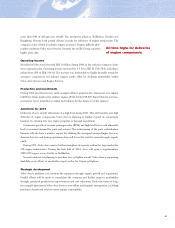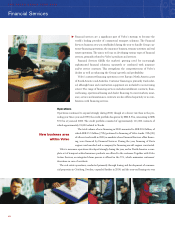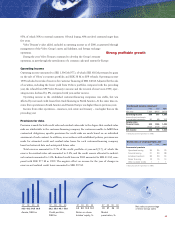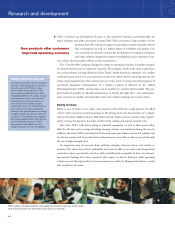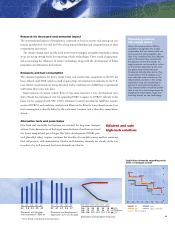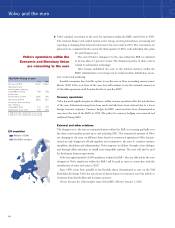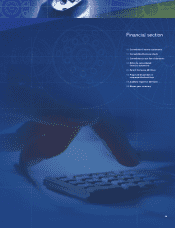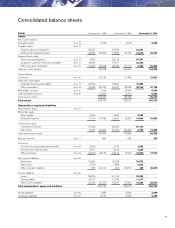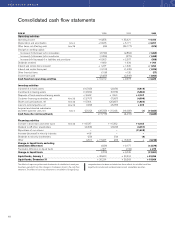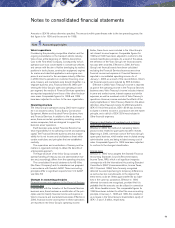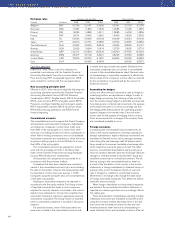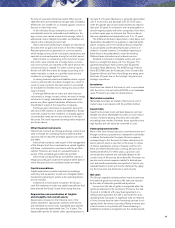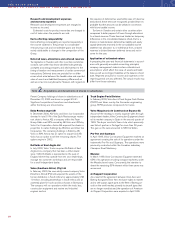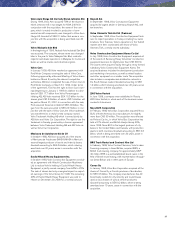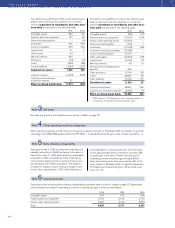Volvo 2000 Annual Report Download - page 50
Download and view the complete annual report
Please find page 50 of the 2000 Volvo annual report below. You can navigate through the pages in the report by either clicking on the pages listed below, or by using the keyword search tool below to find specific information within the annual report.
48
Volvo and the euro
Volvo’s gradual conversion to the euro, for operations within the EMU, started late in 2000.
The common finance and control system in the Group, covering transactions, accounting and
reporting, is changing from national currencies to the euro early in 2001. The conversions are
planned to be completed by the end of the third quarter of 2001, with individual time plans
for each business area.
The cost of Volvo’s changeover to the euro within the EMU is estimated
to be less than 0.1 percent of sales. The dominant portion of these costs is
related to information technology.
After having established the euro as the internal currency within the
EMU, administrative cost savings can be realized within distribution, inven-
tory control and marketing.
Swedish companies have had the option to use the euro as their accounting currency since
March, 2000. Volvo is in favor of the euro, but will continue to use the national currency in
its Swedish operations until Sweden decides to join the EMU.
Treasury operations
Volvo has made significant gains in efficiency within treasury operations after the introduction
of the euro. Substantial savings have been made and risks have been reduced due to a lower
foreign currency exposure. Currency hedges for EMU currencies have been denominated in
euro since the start of the EMU, in 1999. The policy for currency hedging was reviewed and
redefined during 2000.
External and other relations
The changeover to the euro in external relations within the EMU is occurring gradually over
the three-year transition period up to and including 2001. The commercial partners of Volvo
are changing to the euro on different dates, based on commercial agreements. Volvo has pro-
moted an early changeover of both suppliers and customers to the euro. A common currency
simplifies calculations and administration.Volvo supports its dealers through a close dialogue
and through offers and plans to install euro-compatible systems. The euro will also be used
for third-party business agreements.
Volvo has approximately 10,000 employees within the EMU who are affected by the euro
changeover. Volvo employees within the EMU will be paid in euros in connection with the
introduction of notes and coins in 2002.
Since 1999, it has been possible to list Swedish shares denominated in euro on the OM
Stockholm Exchange. Volvo has not chosen to list its shares or to report in euro but will do so
if interest from shareholders and investors increases.
Greece became the 12th member state of the EMU, effective January 1, 2001.
Volvo’s operations within the
Economic and Monetary Union
are converting to the euro
EU countries
Member of EMU
Non-EMU members
▲
The Volvo Group in euro
1999 2000
Net sales, EUR M 14,167 15,394
Operating income,
excluding items affecting
comparability, EUR M 762 728
Income after
financial items, EUR M 3,920 739
Net income, EUR M 3,651 557
Income per share, excluding
items affecting
comparability, EUR 1.41 1.33
Dividend per share, EUR 0.79 0.95
In 2000, EUR 1.00 = 8.4494 SEK, annual average
In 1999, EUR 1.00 = 8.8245 SEK, annual average





